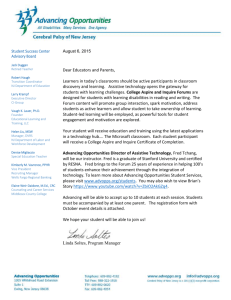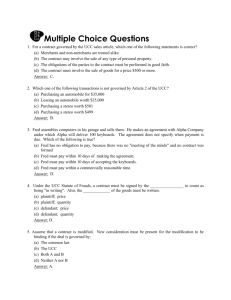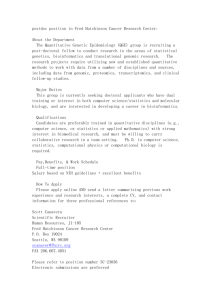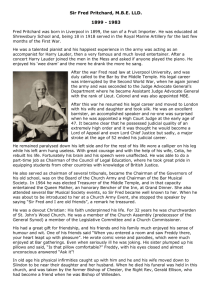Fre? Boiley in Japon: Art Inrncent Abroa?
advertisement
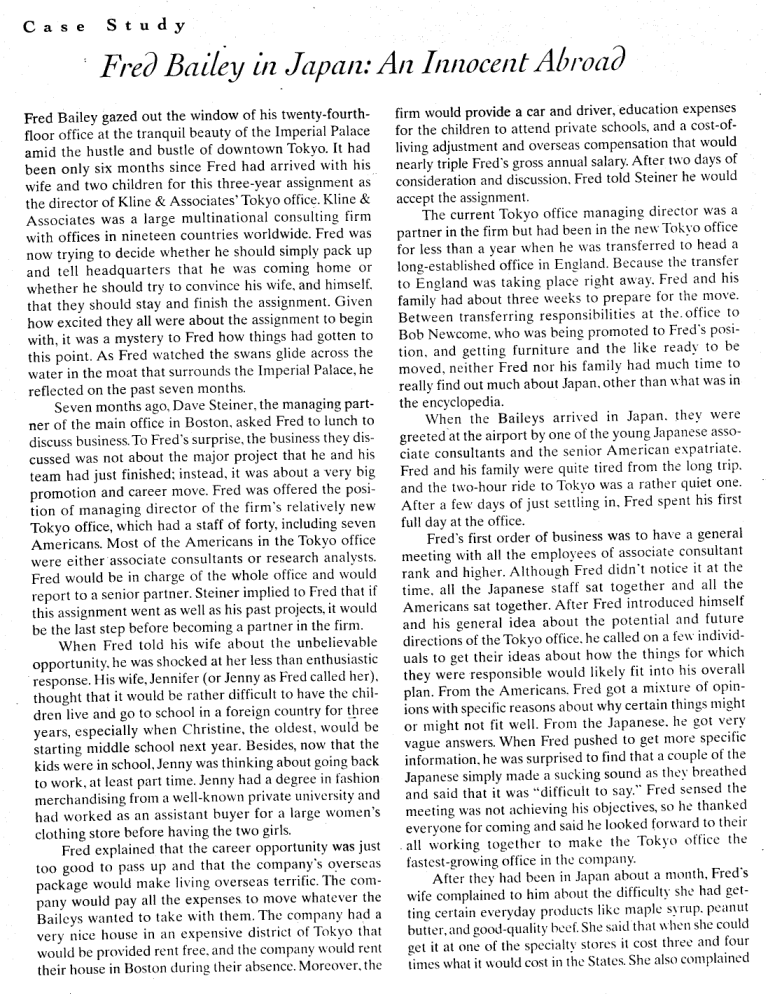
Case Study ' Fre? Boiley in Japon: Art Inrncent Abroa? Fred Bailey gazed out the window of his trventy-fourthfloor office at the tranquil beauty of the lmperial Palace amid the hustle and bustle of downtown Tokyo. It had been only six months since Fred had arrived rvith his rvife and iwo children for this three-year assignment as the director of Kline & Associates'Tokyo office' Kline & Associates was a large multinational consulting firm with offices in nineteen countries worldwide' Fred rvas now trying to decide whether he should simply pack up ancl tell headquarters that he rvas coming home or whether he should try to convince his rvife, and himself' that they should stay and finish the assignment' Given how excited they all were about the assignment to begin with, it rvas a mystery to Fred how things had gotten to this point. As Fred rvatched the swans glide across the water in the moat that surrounds the Imperial Palace, he reflected on the Past seven months. Seven months ago, Dave Steiner, the managing partner of the main office in Boston, asked Fred to lunch to discuss business. To Fred's surprise, the business they discussed was not about the major project that he and his team had just finished; instead, it rvas about a very big promotiort and career move. Fred rvas offered the posiiion of managing director of the firm's relatively new Tokyo office, which had a staff of forty, including seven Amlricans. Most of the Americans in the Tokyo office rvere either'associate consultants or research analvsts' Fred would be in charge of the whole office and rvould report to a senior partner. Steiner implied to Fred that if this assignment went as well as his past projects, it would be the last step before becoming a partner in the firm' When Fred told his rvife about the unbelievable opportunity, he was shocked at her less than enthusiastic ,"rpont.. His wife, Jennifer (or Jenny as Fred called her)' thought that it would be rather difficult to have the childrenlive and go to school in a foreign country for three years, especially when Christine, the olclest, rvould be starting middle school next year. Besides, norv that the kids were in school, Jenny was thinking about going back to work, at least part time. Jenny had a degree in lashion merchanclising frorn a well-knolvrt private university and hacl rvorked as an assistant buyer for a large rvotncn's clothirrg store before having the two girls' Fred explained that the career opportunitY rvas just too good to pass up and that the company's overscas package rvoultl make living overseas terrific' The company would pay all the expenses to move whatever the buii"yt wanted to take rvith them' The company had a very iice house in an expensive district of Tok-vo that rvoirlcl be provided rent free' and the col'npany u'ould rerrt their house in Boston during their absence' Moreover' thc firm rvould provide a car and driver, education expenses for the children to attend private schools, and a cost-of- living adjustment and overseas compensation that rvould neaity trlpte Fred's gross annual salary. After tu'o days of consideralion and discussion, Fred told Steiner he rvould accept the assignment' The current Tokyo office managinq director rvas a partner in the firm but had been in the neu Tokvo office ior Iess than a year rvhen he rvas transferred to head a long-established office in Eneland' Because the transfer to England was taking place right arvaY' Fred and his famill'136 about three rveeks to prepare for the move' Betrveen transferring responsibilities at the. office to Bob Nervcome, rvho was being promoted to Fred's position, and getting furniture and the like readv to be moved. neither Fred nor his family had much time to really find out much about Japan. other than u het rvas in the encyclopedia. When the Baileys arrived in Japan' thev rvere greeted at the airport by one of the young Japanese asso- fiate consultants and the senior American erpatriate' Fred and his family were quite tired from the long trip' and the trvo-hour ride to Tokl'o was a rather quiet one' After a feu' days of just settlins, in, Fred spent his first full day at the office. Fred's first order of business was to ha'r'e a general meeting rvith all the emplovees of associate consultant rank aid higher. Although Frecl clidn't notice it at the time, all the Japanese staff sat together and all the Americans sat together. After Fred introduced himself and his general idea about the potential ancl future directioni of the Tokyo office. he called on a fcu individuals to get their ideas about how the things for which they we"re responsible would likely fit into his overall plan. From the Arnericans. Fred got a mi\ttlre of opinnright ions with specific reasons abor'rt why certain things or night not fit well. Fronr the Japanese' he got verv vague"answers. When Fred pushed to get more specific a couple of the thcv breathed as sound Japanese sirnply made i sucking sc-nsed the Fred say.'' to "difficult and said that it was thanked he so objectives, his meeting lvas not achieving to their fors'ard looked he said ancl .u".yoi" for coming the officc Tokl'o the make to rvorking togethcr information, he was surprised to find that all fastest-grorvirrg office in the corttpany' AfGr thci:hacl bcen in Japan about a nrtuth' Fred's to him aboLrt the difficultv sht' had get- wife conrplairied ting certain everyday prtlclucts likc maplc s)l'tlp' pealltlt buiter, and good-quaiity bcef. She saicl that u hcrt she cotticl get it at oni crf the spe'cialtv stores it cost threc' atrcl four iinres ,vhat it *,ould cost i' thc States. She also c.'r'lained that since the rvasher and dryer were much too small, she had to spend ertra money by sending things out to be drycleancd. On top of all that, unless she rvent to the American Club in dorvntorvn Tokyo' she never had anyone to talk to. After all, Fred was gone ten to sixteen hours a dar,. Unfortunately, while Jenny talked, Fred was preoccupied, thinking about a big upcoming me-eting between his i'irm and a significant prospective ilient, a top-100 Japanese multinational comPanY. The next day, Fred, alorlg rvith the lead U'S' consultant for the potential contract, Ralph Webster, and one of the Japanese associate consultants, Kenichi Kurokawa, rvho spoke perfect English' met with a team from the Japanese firm. The Japanese team consisted of four members: the vice president of administration, the director of international personnel, and trvo staff specialists' After shaking hands and a ferv au'kward bows, Fred said that he knew the Japanese gentlemen were busy and he didn't want to rvaste their time, so he would get right to the point. Fred then had the other American lay out theii firm's proposal for the project and what the project u'ould cost. After the presentation, Fred asked the Japanese what their reactiorr to the proposal was' The Japanese did not respond immediately, so Fred launched inio his summary version of the proposal' thinking that the translation might have been insufficient' Again, the Japanese had only the vaguest of responses to his direct questions. The recollection of the frustration of that meeting rvas enough to shake Fred back to reality. The reality was that in the five months since that first meeting little progress had been made and the contract between the firms was yet to be signed. "I can never seem to get a direct response from Japanese," he thought to himself' This feeling of frustration led him to remember a related incident that happened about a month after this first meeting rvith this client. Fred had decided that the reason not much progress rvas being made with the client was that he and his group just didn't knorv enough about the client to package the in a way that was appealing to the client' proposal ^Consequentlv. he called in Ralph Webster, the senior rvith the proposal' and asked him associated AmeriCan the client so that the proposal on report a to develop changed rvhere necessary' and reevaluated be could of the more promising one that decided they Jointly. Japanbse research associates' Tashiro Watanabe, rvould Ue ttre best person to take the lead on this report' To impress upon Tashiro the importance of this task and the g..ut pot"ntial they sarv in him, they decided to have the young Japanese associate meet with both Fred and natph. ln ttre meeting, Fred and Ralph laid out the nature and importance of the task, at rvhich point Fred leaned forward in his chair and said to Tashiro, "You can see that this is an important assignment and that we are placing a lot of confidence in you by giving it to you' We need the report by this time next week so that we can revise and represent our proposal. Can you do it'l" After a somewhat pregnant pause, Tashiro rcspolldcd hesitantly, "I'm Irot sure what to sav." At that point, Fred smiled, got up frorn his chair, rvalked over to lhc 1'oung Japanese associate, extended his hand, and saicl. "Hey, there's nothing to say. We're just giving you the opportunity you deserve." ihe day before the report was due. Fred asked Ralph horv the report rvas comins. Ralph said that. since he had heard nothir.rg from Tasltiro, he assutned everything tvas undei control but that he would clout"rle-check' Ralph later ran into one of the U.S. t'cscarclt rssociltes' John Maynard. Ralph knew that John was hired for Japan because of his Japanese language ability and that, unlike any of the other Americans, John often weut out after work with some of the Japanese reseal'ch associ- if he kncw thcn John report. how Tashiro was coming on the Tashiro night previous recounted that at the office the had asked if Americans sometimes fired enrployees for being late with reports. John had sensed that this was more than a hypothetical question and askcd Tashiro why he wanted to know. Tashiro did not res;lond immediately, and since it was 8:30 in the evening. Johrt suggested they go out for a drink. At first Tashiro resisted' but then John assured him that tl-rey would grab a clrink at a nearby bar and come right back. At the bar, John got ates, including Tashiro. So Ralph asked John Tashiro to open up. Tashiro explained the nature of the report that he had been requested to produce. He continued to explain that, even though he had rvorked long into the nigltt every night to complete the report, it was just impossible and that he had doubted from the beginning wltether he could complete the report in a rveek. At this point, Ralph asked John, "Why didn't he say something in the first place?" Ralph didn't wait to hear whether or not John had an answer to this question' He headed straight to Tashiro's desk. Ralph chewed out Tashiro and then went to Fred, explaining that the report rvould not be read,v and that Tashiro, from the start. didn't think it could be"'Then rvhy didn't he say something?" Fred asked. No one had any answers. and the rvhole episode left everyone more suspect and uncomfortable u'ith each other. Other incidents, big and small, had made the last two months especially frustrating. but Fred was too tired to remembeithem all.To Fred it seemed that rvorking rvith Japanese both inside and outside the firm was like working with people from another planet. Fred felt he couldn't communicate with them, and he never could figure out what they were thinking. It drove him crazy. On top of all this, Jennifer laid a bombshell on him' She wanted to go home, and yesterday was not soon enough. Even though the kids seemed to be doing all right, Jennifer was tired of Japan-tired of begin stared at, of not understanding anybody or being understood, of not beine able to find what she wanted at the store, of not being able to diive and read the road signs, of not having anything to watch on television, of not being involved in anything. She wanted to go home and could not think of any reason why they shouldn't. After all, she reasoned, they owed nothing to the company because the company had led them to believe this rvas just another assignment, like the two years they spent in San Francisco, and it was anything but that! Fred looked out the windorv once more, wishing that somehow everything could be fixed, or turned back' or something. The trafflc below rvas backed up' Though the traffic lights changed, the cars and trucks didn't seem to be movi-ng. Fortunately, beneath the ground' one of the rvorld's most advanced, efficient, and clean subrvay systems moved hundreds of thousands of people about the cit-v and to their homes. CASE QUE,STIONS 1. You are Fred.What should you do now? 2. Turn back the clock to u'hen Fred rvas offered the position in Toki'o. What. if anything. should have been clone differently. and by whom? Source: J. Steuart Black. in Internotional htunan ResLturce (Boston: trIanagentent.eds. NI. Mendenhall and Gary Oddou P\\'S-Kent, 1991).

